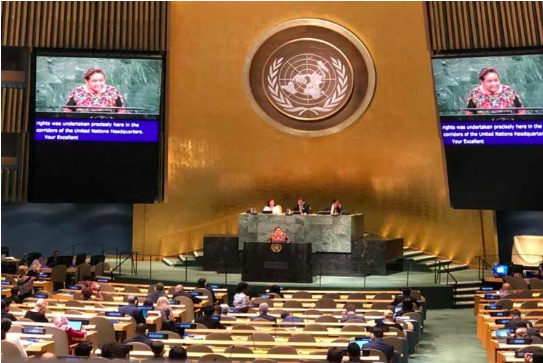FREE FLOW OF INFORMATION
An article from Prensa Latina
The goodwill ambassador of Unesco, Rigoberta Menchú, highlighted today [5 Sep] in the high level forum of the UN General Assembly the obstacles that prevent the development of a culture of peace.

(click on photo to enlarge)
29 years have passed since the concept of a culture of peace was proposed at a Unesco event, and on October 6 next year will be two decades after the adoption of the Declaration and Program of Action for a Culture of Peace, recalled the indigenous leader and Nobel Peace laureate.
Currently, the legitimacy and fairness of that declaration and of the action program – as international legal norms and instruments – are unquestionable decisions that have irrefutable validity, she said.
But the good wishes tthat the culture of peace should become positive law are opposed by the historical tendencies of a culture of violence and war, she added. The culture of peace is a utopia with great obstacles and enemies.
Instead of decreasing, threats increase and multiply, she warned.
Only a hundred rich individuals concentrate the world’s wealth, while malnutrition and extreme poverty directly affect 60 percent of the world population, lamented the goodwill ambassador of Unesco.
(Article continued in the column on the right)
(Click here for the original Spanish version of the article)
Where in the world can we find good leadership today?
(Article continued from the column on the left)
According to this calculation, four billion 408 million people are direct victims of inequalities and global exclusions, she explained.
“The arms race is a manifestation of the nuclear, chemical and bacteriological war industry and who knows what other lethal methods are being tried to annihilate human life in a massive and rapid way.”
Menchú also warned about global warming, its irreversible damage to the planet and the little that has been achieved on this issue, despite the international agreements that have been adopted.
In the same way, she spoke about the tragedy that corruption and impunity represent in the world. They violate democracy, impede sustainable development, and put the peoples at risk.
‘Once again the most horrendous practices of racism and discrimination, xenophobia and homophobia offend conscience and annihilate human dignity’.
She also called for a halt to hate-filled speeches and ttitudes that are on the increase in different corners of the planet and she gave as an example the recent actions against migrants at the borders of the United States. Confining migrant children in concentration camps reminds us of the horrors of the holocaust of World War II, she said, and she criticized the dehumanization behind practices that are assumed as a normal fact.
Menchú regretted that the Declaration and Program of Action for a Culture of Peace has suffered the same fate as other international instruments and initiatives, due to the lack of political will, especially from States, economic and political sectors.
She also highlighted the peaceful worldview of the indigenous peoples of the world and how the culture of peace should be understood again as a transversal theme.
However, this is not possible when the economic, political and social machinery goes in the opposite direction and its effects disrupt any institutional mechanism, any individual and collective will to live in peace, she concluded.